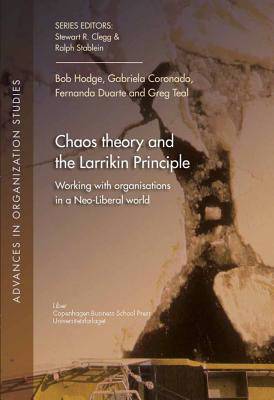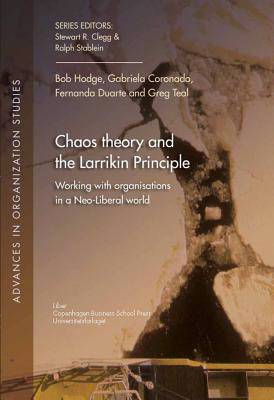
- Afhalen na 1 uur in een winkel met voorraad
- Gratis thuislevering in België vanaf € 30
- Ruim aanbod met 7 miljoen producten
- Afhalen na 1 uur in een winkel met voorraad
- Gratis thuislevering in België vanaf € 30
- Ruim aanbod met 7 miljoen producten
Zoeken
Chaos Theory and the Larrikin Principle
Working with Organisations in a Neo-Liberal Worldvolume 26
Bob Hodge, Gabriela Coronado, Fernanda Duarte, Greg Teal
€ 32,45
+ 64 punten
Omschrijving
This lively, accessible book applies ideas from chaos and complexity theory to core issues in organization studies. It develops a new critique of managerialism and (its global godfather) neo-liberalism, which are still dominant ideologies in management today. It complements theoretical critique with stories and voices from the front line of organizational life in Australia, Mexico, and Brazil. Chaos Theory and the Larrikin Principle argues that managerialism is unjust - with linearity, rigidity, and the will to control - producing dysfunctional organizations which then require alternative practices in order to survive. Managerialism's efforts to ignore these basic facts of organizational life leave it enmeshed in unacknowledged contradictions, unable to understand itself or develop new strategies. The book gathers these alternative practices under the rubric of the Larrikin Principle. The Larrikin is known in Australian popular culture as a carrier of a distinctive Australian identity: egalitarian improviser, rule-bender, relentless foe of managerial double-speak. This book takes the Larrikin figure back to its archetypal origins which have similar manifestations across the globe. The transcultural, postmodern Larrikin Principle carries principles and strategies of critical management and chaos theories into academic management studies and contemporary organizational life. It is a breath of fresh air that will be appreciated by students, practitioners, and victims of today's managerialism.
Specificaties
Betrokkenen
- Auteur(s):
- Uitgeverij:
Inhoud
- Aantal bladzijden:
- 243
- Taal:
- Engels
- Reeks:
- Reeksnummer:
- nr. 26
Eigenschappen
- Productcode (EAN):
- 9788763002356
- Verschijningsdatum:
- 1/09/2010
- Uitvoering:
- Paperback
- Formaat:
- Trade paperback (VS)
- Afmetingen:
- 165 mm x 239 mm
- Gewicht:
- 417 g

Alleen bij Standaard Boekhandel
+ 64 punten op je klantenkaart van Standaard Boekhandel
Beoordelingen
We publiceren alleen reviews die voldoen aan de voorwaarden voor reviews. Bekijk onze voorwaarden voor reviews.











